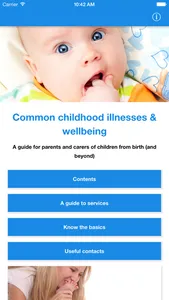This resource has been put together by NHS Oldham Clinical Commissioning Group.
Every parent or carer wants to know how to do what is best for their growing baby and to give them the best start in life. This resource aims to help you understand what to do and who to ask in a number of situations; including what to do when your baby or child is ill. Learn how to care for your child at home, when to seek advice from a health visitor or call a doctor and when to use emergency services.
Most of the issues you will be confronted with are simply an everyday part of growing up, often helped by a chat with your midwife or health visitor. Almost all babies, toddlers and children will get the most common childhood illnesses like chickenpox, colds, sore throats and ear infections. While these are not very nice at the time, they are easily treated at home with support from your GP or health visitor, with no need to visit the Accident and Emergency (A&E) department.
The information in this resource is a guide and cannot replace specialist care. If you are worried, you must seek further advice - trust your instincts, you know your child best.
Every parent or carer wants to know how to do what is best for their growing baby and to give them the best start in life. This resource aims to help you understand what to do and who to ask in a number of situations; including what to do when your baby or child is ill. Learn how to care for your child at home, when to seek advice from a health visitor or call a doctor and when to use emergency services.
Most of the issues you will be confronted with are simply an everyday part of growing up, often helped by a chat with your midwife or health visitor. Almost all babies, toddlers and children will get the most common childhood illnesses like chickenpox, colds, sore throats and ear infections. While these are not very nice at the time, they are easily treated at home with support from your GP or health visitor, with no need to visit the Accident and Emergency (A&E) department.
The information in this resource is a guide and cannot replace specialist care. If you are worried, you must seek further advice - trust your instincts, you know your child best.
Show More




